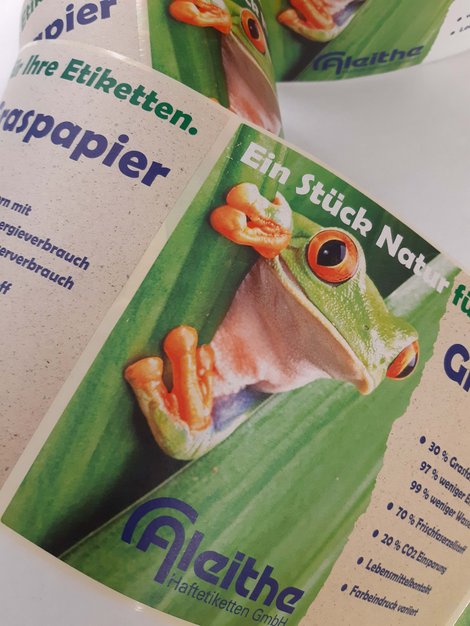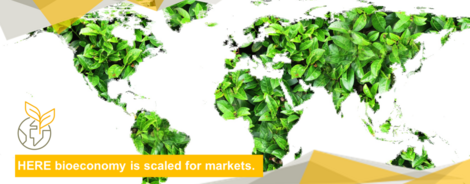Labels Made from Grass and Marble
Packaging and paper companies in Saxony-Anhalt opt for natural raw materials

The bioeconomy is playing a central role in paving the way to a sustainable and climate-neutral economy. Saxony-Anhalt is fast becoming a model region for all things bioeconomy. The importance of natural raw materials and environmentally friendly production is also being embraced more and more in the packaging and paper industry. Take Aleithe Haftetiketten GmbH from Lutherstadt Wittenberg, for example, which produces its labels using grass and marble. Progroup AG with its high-tech paper factory in Sandersdorf-Brehna and pulp manufacturer Mercer Stendal have also opted for environmentally friendly manufacturing methods in the paper industry.
Self-adhesive labels for products across Germany
The paper that Kerstin Aleithe is holding in her hands has a green sheen to it and smells unmistakably … of grass. “That’s because the paper really is made of grass – partially, at least. 30% percent of the pulp used to manufacture it is replaced with grass. This is more ecological: grass grows faster than wood and, when used to make paper, requires 99% less fresh water, 20% less CO2 and 97% less energy,” says Kerstin, Managing Director of Aleithe Haftetiketten GmbH. She heads the family business in Saxony-Anhalt together with her brother Thomas. The company specializes in the manufacture of self-adhesive labels for customers in areas such as the pharmaceutical, chemical and food industries. The labels are used on products all over Germany, from medicines to packaged supermarket sausages, to display key consumer information.
Using waste as raw material
“The bioeconomy and the transition from crude oil-based to natural raw materials is an important trend for us. There is increasing demand from the market for sustainable materials in our labels,” says Kerstin. She goes on to explain that they decided to specialize in this area long ago and offer their customers a huge variety of paper and film labels that are now made from natural materials such as marble, rather than crude oil-based materials. “To make this kind of film, known as stone paper, we grind waste from quarries into a fine powder and mix it with a small amount of recycled plastic. This marble powder would otherwise just go to waste. The film can be added to the normal recycling stream,” she explains. This saves 80% of the plastic used in conventional plastic films. According to Kerstin, all types of natural leftover materials like marble can be used to make labels, such as pressed apple peel or the remains of barley or wheat.
Aleithe offers its customers packaging labels made from a diverse range of thousands of materials that can be combined in many different ways. “We recommend a suitable material to our customers based on the type of packaging and their requirements,” says Kerstin. Customers can use the labels to display either product information or marketing.
Aleithe produces several million square meters of film each year
In 2015, business manager Kerstin and her brother Thomas took over from their father Bernd Aleithe as managing directors of Aleithe Haftetiketten GmbH. Bernd founded Aleithe as a one-person company in 1992 in Lutherstadt Wittenberg. Back then the business really was just one person, but Aleithe now employs 70 people and is the third largest product label company in Germany after two big industrial firms. It produces several million square meters of film from its raw materials each year.
Aleithe keeps growing: plans are currently underway to build a facility to house a new special-purpose machine. At a cost of around one million euros, the machine can produce 100,000 packaging sleeves per hour for customers in industries such as food. “We have developed an ecological process here, too. The only plastic we use on the packaging sleeves is for the section where the labelling is printed. The rest is made of paper which can be recycled,” explains Kerstin.
Progroup also investing in modern green technology with 100 million euros for sustainability
Green high-tech strategies can also be found at Progroup, a containerboard manufacture that uses only waste paper as its raw material. Last year, the company put a new paper factory into operation in Sandersdorf-Brehna for the manufacture of environmentally friendly, high-quality containerboard. The factory has a yearly capacity of 750,000 tonnes. “The new paper machine will allow us to produce containerboard sustainably and energy-efficiently for the next 50 to 60 years. That’s why we are investing 100 million euros in sustainability strategies alone,” said Maximilian Heindl, Chief Development Officer and member of the board of Progroup, at the factory opening ceremony. The company has made its production more sustainable by using what is the world’s largest waste paper drum and an innovative circulating water plant, which treats the used process water before returning it into the closed circulation system for paper production. The plant reduces Progroup’s use of fresh water by 80%, which equates to 3.7 million cubic meters of water each year. What’s more, impurities in the waste paper are biodegraded and converted into biogas. This reduces the factory’s overall consumption of fossil fuels by 10%. “The paper factory is one of the most modern and powerful in the world, and is a prime example of Saxony-Anhalt’s admirable transition to becoming the state for technologies of the future,” said Saxony-Anhalt’s Minister for the Economy, Prof. Armin Willingmann.
Mercer Stendal replacing crude oil with a bioeconomy to produce kraft pulp
Mercer Stendal is an excellent example of the bioeconomy boom that is taking place as part of the structural transformation. The company sustainably produces high-quality, tear-resistant kraft pulp as a raw material for the paper industry. During the production process, biochemicals such as tall oil are obtained from the resin of processed coniferous trees. Tall oil is a renewable raw material that can replace fossil fuel-based raw materials. It is used in the chemical industry for applications such as manufacturing ink, paints and adhesives, and can also be used to produce biodiesel.
Author: Michael Falgowski/IMG Sachsen-Anhalt

As a long standing location for the nutrition, chemicals, wood/cellulose and agricultural economy,
we have excellent knowledge of renewable resources and biotechnology processes as the basis for industry, energy and nutrition.
